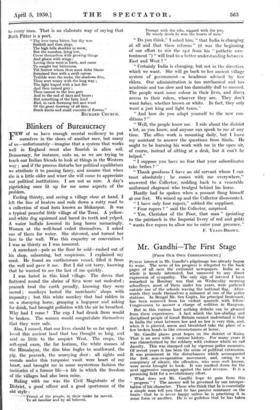Blinkers of Bureaucracy . T EW of us have enough mental resiliency
to put ourselves in the shoes of another race, but many of us—unfortunately—imagine that a system that works well in England must also flourish in alien soil. Democracy, for instance, suits us, so we are trying to teach our Indian friends to look at things in the Western way ; and if the process disturbs her political equilibrium we attribute it to passing fancy, and assume that when she is a little older and wiser she will come to appreciate our political institutions. I am not so sure. A day's pigsticking once lit up for me some aspects of the problem.
Feeling thirsty, and seeing a village close at hand, I left the line of beaters and rode down a rutty road to a collection of mud huts known as Shikarpur. It was a typical peaceful little village of the Terai. A yellow- and-white dog squirmed and bared its teeth and yelped. A water buffalo lowered its long horns menacingly. Women at the well-head veiled themselves. I asked one of them for water. She shivered, and turned her face to the wall. Was this coquetry or convention ? I was as thirsty as I was innocent. A mercliant—pale as the flour he sold—rushed out of his shop, salaaming, but suspicious. I explained my need. He found an earthenware vessel, filled it from the well and gave it me. But I did not tarry, knowing that he wanted to see the last of me quickly..
I was hated in this kind village. The doves that fluttered round the shrine of Siva were not molested ; peacock trod the earth proudly, knowing they were sacred ; monkeys looted the merchants' shops with impunity ; but this white monkey that had ridden in on a stamping horse, grasping a hogspear and asking for drink, had brought pollution with the air he breathed. Why had I come ? The cup. I had drunk from would be broken. The women would congratulate themselves that they were safe.
Alas, I mused, that our lives should be so far apart. I loved this ancient land that has thought so long, and said so little to the unquiet West. The crops, the soft-eyed oxen, the far horizon, the white masses of the Himalayas, the dim blue bugles to southward, the pig, the peacock, the scurrying deer : all sights and sounds under this turquoise vault were heart of my heart, and brought me in some mysterious fashion the memories Of a -former life—a life in which the freedom of the villages had also been mine. - Riding with me was the Civil Magistrate of the District, a good officer and a good sportsman of the old 'style : "'Friend of the people, in their .midst he moved,
To all familiar and by all beloved. Prompt with the rifle, niggard with the pen, By manly deeds he won the hearts of men."
" Do you think," I asked him, " that India is changing at all and that these reforms " (it was the beginning of our effort to stir the ryot from his " pathetic con- tentment ") " will lead to a better understanding between East and West ? "
" Certainly India is changing, but not in the direction which we want. She will go back to her ancient village system of government—a headman advised by five elders. Our administration is too mechanical and too academic and too slow and too damnably dull to succeed. The people want some colour in their lives, and direct access to their rulers, whoever they are. They don't want babus, whether brown or white. In fact, they only want a just king and light taxes."
" And how do you adapt yourself to the new con- ditions " " Well, the people know me. I ride about the district a lot, as you know, and anyone can speak to me at any time. The office work is mounting daily, but I leave my assistant to answer the questions from Simla. He ought to be learning his work with me in the open air, of course, instead of sitting at a desk, but it can't be helped."
" I suppose you have no fear that your subordinates take bribes ? "
" Thank goodness I have an old servant whom I can trust absolutely ; he comes with me everywhere," answered the Collector, nodding back to a venerable uniformed chaprassi who trudged behind his horse. Hardly had he spoken when a peasant flung himself at our feet. We reined up and the Collector dismounted. " I have only four rupees," sobbed the suppliant.
" Four rupees " said the Collector, surprised.
" Yes, Cherisher of the Poor, that man " (pointing to the patriarch in the Imperial livery of red and gold)' " wants five rupees to allow me to enter your presence." F. YEATS-BROWN.










































 Previous page
Previous page